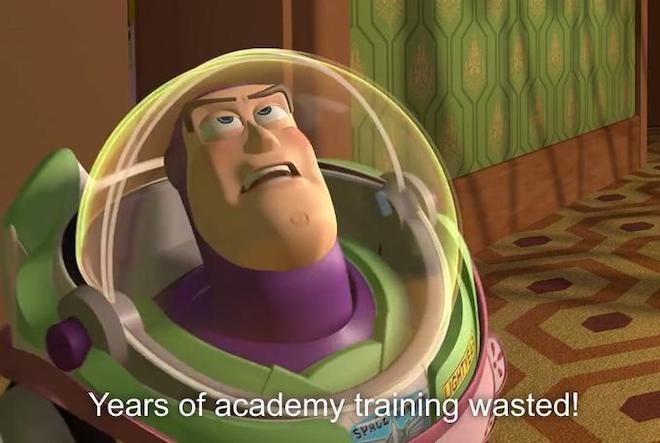
Well, the link to sh.itjust.works doesn’t load for me.
Its Buzz lightyear saying: Years of Academy training wasted!
deleted by creator
You are supposed to either already have connections, or be forced to adapt your skills to create connections.
Ya know, they just want to make sure you’re one of them first and not one of the others
While the tone of this post is mocking, it’s a very real thing that having the social skills to match someone else’s vibe during an interview can help tremendously with helping the interviewer see you as someone who can fit with the company culture.
I see people who struggle with getting jobs often are lacking in those sort of soft social skills.
deleted by creator
If you lack social skills you better have some sort of labor relevant skill to replace it with them!
I honestly need to work more on my connecting. Hopefully not any time soon but that networking gives me hella anxiety
Where and when you’re searching plays into it.
If you’re looking for postings, you’ll have an easier time finding a job, but a harder time getting it, because there’s so much competition.
If you’re searching right after graduation, so’s the rest of your class, and you have to compete with them.
If you’re hitting up relevant companies in hopes that they can hire you, you’ll have a harder time finding a place with an opening, but once you do, the competition is near zero. You need only prove you’re a good fit.
That’s because we told them that there would be jobs on the other side of that debt.
Just lie your way in. Worry about how to do the job later.
You just finished 17+ years of education and invested a small fortune into yourself. If that isn’t enough for a career with a living wage and the possibility of advancement, what’s the point?
The point is to lock you into indentured servitude. As one of my favorite psychology professors likes to say: “The administration has figured out how to pick the pockets of students’ future earnings”.
Government pumps a bunch of “money” into the industry, and I put money in quotes because it’s the student who’s responsible for it. The government’s part is making it guaranteed that you get that loan. Oh, and also making that loan immune to bankruptcy.
That drove the price of college up enormously. So then you’ve got 18 year old kids signing papers to take on five or six figures of debt they can’t escape. These are people who’ve possibly never held a job, maybe never paid a bill in their life or taken a loan, being given automatic approval for huge loans.
It may not have been “designed” to do this, but the end result is a looney tunes style conveyer belt saddling people with huge debt, and in the process making college administrations very rich.
Consume the wealthy
My first employer out of college told me explicitly they hired me because I was willing to stick with a 4 year program, and though I didn’t have experience they were confident I’d stick around enough to be trained. I got an art degree and it was a computer science job 🤔
You can be trained to code and probably came cheap. Companies willing to invest in people are very rare in this day and age.
This is a weirdly reductionist take. Implying that anyone can be “trained to code” seems to imply that coding is a rote skill that can be easily trained into anyone, completely dismissing the fact that some brains will just inherently do better at it than others. Also the generalization you make about companies that are willing to to train their potential hires is not true everywhere.
As someone who isn’t a coder, I was able to pick up enough Visual Basic back in the day to figure out how to make some basic apps for myself. It only involved learning a few concepts and commands. That should be enough for anyone with a college degree to do. Simple coding at a low level, learning enough to maintain a website that’s already been designed for example, as long as nothing catastrophic happens, can definitely be done by anyone.
The problem now is that it can also be done by AI.
AIs are worse at coding than they are at art, and that’s saying something
Congrats, I spent a stupid amount of effort trying to do just that, ended up breaking into other industries.
That was how it was marketed. Explain to me how there’s not a class action lawsuit there. I remember a woman in a pantsuit with a university lanyard around her neck coming into a high school class to give a presentation about how many millions more dollars a college graduate makes. There are people in this world whose death I would celebrate with a prolonged dance involving a significant amount of hip thrusting. Hers is one of them, if I knew who she was.
Did she ever say YOU were gonna get that extra money though?
Her thesis statement was certainly “If you go to college, you will earn more money.”
She is probably an English major. You was a metaphor.
A minimum 4 year commitment was supposed to make you more valuable in the job market. That was the entire point or at least the message broadcasted. If a degree isn’t conducive to large potential for at least a 30% increase in wages, what’s the point of that time invested? Either institutes are adequately designed to promote this or they’re effectively useless in a practical sense.
deleted by creator
I’m curious to know what your degree is in. I’m not disagreeing with you, but I think many young people are mislead into believing that just getting a degree will be a ticket to financial freedom, but what type of degree a person gets does matter
Might depend on the degree. I got CS degree and have been getting interviews far more easily than before the degree.
Plenty of people have CS degrees but are not having the same result as you. There’s likely other factors at play, it’s not just the degree
That may be true I do live in a techie area in Colorado however I applied for similar jobs in the past without a degree with no contact back. Literally the only difference is the degree.
My school did help me create a resume that seems to function better with the systems in place by employers to where hot words pop out better.
When I was an undergrad my professors put a big emphasis on developing a portfolio of work and picking up experience where we could before graduation. For me that meant freelancing a few times a month while working a part time job along with class. Internships are great, but everyone had to have one to graduate from my program. A degree will set you up, but a portfolio of work and related experience will help set you apart.
“Degree required. Must have 10 years experience.” – Every job available
You’ll also need ten years of programming experience in a language that has only existed for 2 years.
I joined the military after I had run out of money for college, and out of sheer luck ended up in a job vastly preferable to what I had been going to college for (military aviation search and Rescue vs. Band teacher). Now I’m getting on in years with lots of work experience and no degree, and people in my work are constantly getting poached by avionics and aviation companies (one guy was about 8 years from retirement, where he’d get a paycheck for the rest of his life at 40 years old, did the math, and found he’d make more over his life with the company poaching him).
I’m not saying the military is a good choice for everyone, but in the “get paid while getting experience” thing, it can work out pretty well depending on the field. And if you get into cybersecurity, you’ll end up with at least Secret clearance, which is a hot commodity if you can secure a job straight out of getting out of the military.
Just don’t be, like… infantry or admin. Have a plan going in for getting out.
deleted by creator
I’m in the Coast Guard. Not sure “War machine” really applies. Especially since our stuff is all from decades ago, and is generally used to save people.
One of the few parts of the military I respect. You guys, the Army Corps of Engineers, the various medical corps, I can’t think of anything else. Basically the parts that aren’t furthering the war machine and actually helping people for the most part.
Although the Coast Guard does participate in the pointless drug war, but nothing’s perfect.
Maybe not yet…
deleted by creator
One is a sucker punch and the other is truth after you’ve signed.
My nephew joined the Marines, wanting to be in infantry. His recruiter spent months fixing his brain and convinced him to pursue avionics instead. Really smart kid and he’s finally understanding how he’s setting himself up well when he gets out. He’s still in B or C school or whatever it’s called.
Yeah these aviation companies are just crazy for band teachers right now.
In hindsight I would have been much happier, healthier and wealthier if I had just gotten a construction job or something after HS instead of torturing myself through a CS degree lmao
Having worked construction for a few years before getting my IT degree:
[X] Doubt
Yep. Was a welder, now a software dev. There are pros and cons to both, but overall I’m way happier now.
That said, this is anecdotal - different strokes and all that.
I work in IT, and I’ve sometimes thought maybe I should’ve gone into construction or something that doesn’t have such a breakneck pace of changing technology.
What was working in construction like, and how does it compare to your IT job now?
Backbreaking is the best way to describe working construction. We did general framing/siding/roofing, and my body hurt every day after I was done. I went into IT specifically for the mental challenge, and because I saw how my uncle and grandfather’s bodies were broken by a lifetime of construction and didn’t want to deal with it for myself.
I’ll gladly take learning new skills constantly over breaking my body.
Thank you for sharing!
Not the person you asked, but I grew up in a rural blue collar area. Construction beats up your body, and even with the right PPE you are at high risk of injury from accident or simple repetitive stress injuries. The work is often exposed to the elements, on stressful timetables, with pressure to work long hours.
Some of the trades can be better, but many have the same issues I listed above. Lots of people in trades or construction feel 60 at 40 from beating their body up.
Thank you for sharing!
I’ve grown up doing hard manual labor most of my free time and let me tell ya, I vastly prefer that over taking exams and being stressed 24/7 for years.
It’d be nice if we didn’t have to pigeon-hole ourselves into one skillset in order to survive.
But think of the shareholders!
Classic case of grass is greener on the other side.
Yep. The grass is greenest where you water it.
It’s been 7 months for me and in all that time I got one job offer that they ultimately gave to someone else. The pain is real…
This is something I’m worried about. I actually have a decent-paying blue-collar job, but I want to be an engineer and expand myself. A lot of entry engineering positions pay less than what I currently make. I’d be happy breaking even, but pay cuts are a hard decision to make.
If you can keep the roof over your head, the goal is to look at longer term earning.
This is a painful trap that keeps a lot of lower income and skill folks down, life forces them to take the short term earning to stay fed, thereby missing out on longer term opportunities
They should have chosen to be born into a wealthier family!
Good glib lemmycomment
The degree will get you the interview. Experience will get you the job.
Unfortunately it’s hard to get in the door without one.
Co-ops, work study, volunteer work, even self employment cannot be understated. They’re not necessarily looking at if you have done the job, but how you’ve handled situations. De-escalation, customer service, team work, taking initiative, and reasoning are all good things to mention during an interview.
Read the job description, research the company, be prepared to ask questions to show engagement, and be prepared to show how your life experience has prepared you for the work.
And be sure to say thank you and send a follow up email or two!














